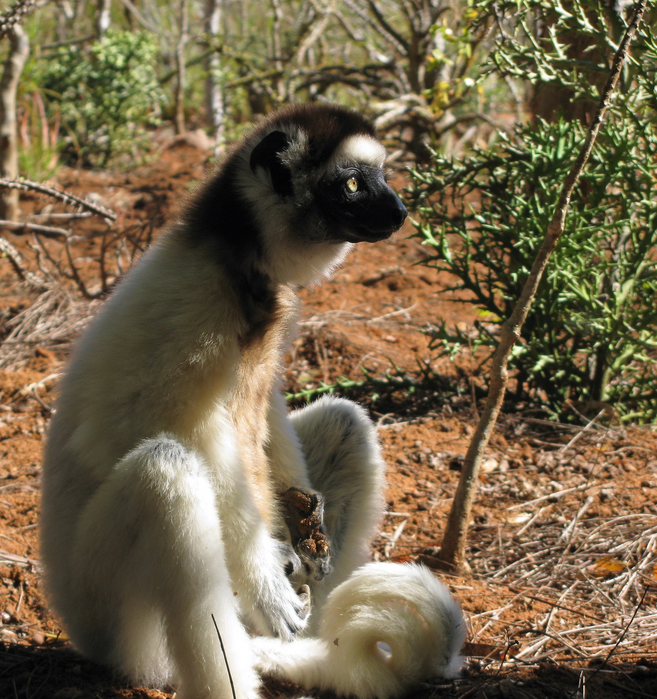Large-scale research of 47 species of monkeys and lemurs revealed that climate change and deforestation are pushing these tree-dwelling animals to the ground, putting them at greater risk due to the lack of food and shelter, meaning that are now likely to have more negative interactions with humans and domestic animals.

Propithecus Verreauxi. Image Credit: San Diego Zoo Wildlife Alliance
The research, guided by Timothy Eppley, Ph.D., a Postdoctoral Associate at San Diego Zoo Wildlife Alliance, investigated over 150,000 hours of observation data on 15 lemur species and 32 monkey species at 68 sites in the Americas and Madagascar. This work was a remarkable global collaboration, with 118 co-authors from 124 distinct institutions.
The research was published on October 10th, 2022, in the journal The Proceedings of the National Academy of Sciences (PNAS).
This study began with a discussion among colleagues about how we’d noticed certain populations of arboreal primates spending more time on the ground. Yet at sites with relatively less disturbance, members of the same species may never descend to the ground.
Timothy Eppley, Postdoctoral Associate, San Diego Zoo Wildlife Alliance
The level of terrestriality — the amount of time spent on the ground — in arboreal primates was estimated by the researchers to be influenced by ecological factors, including potential pressures brought on by humans and/or species-specific qualities.
According to the research, primates that live in large social groups and eat less fruit are more likely to fall to the ground. According to the authors, these characteristics may serve as a “pre-adaptation” to terrestriality. Additionally, primates that lived in hotter settings with less canopy cover had a higher likelihood of adapting to these changes by shifting toward more extensive ground use.
Most of these species have already been stressed by the fact that they live in warmer, fragmented, and extensively disturbed ecosystems with fewer available food resources. As climate change intensifies and arboreal habitats decrease, the research reveals that primates that consume a more diverse diet and live in larger groups may be able to adapt more easily to a terrestrial lifestyle.
It’s possible that spending more time on the ground may cushion some primates from the effects of forest degradation and climate change; however, for the less-adaptable species, fast and effective conservation strategies will be necessary to ensure their survival.
Timothy Eppley, Postdoctoral Associate, San Diego Zoo Wildlife Alliance
The research also highlighted that primate populations living near human infrastructure are less prone to fall to the ground. One of the study’s two senior authors, Luca Santini, Ph.D., from Sapienza University of Rome, stated, “This finding may suggest that human presence, which is often a threat to primates, may interfere with the natural adaptability of the species to global change.”
The shift from an arboreal to a terrestrial lifestyle happened earlier in primate evolution; however, today’s sudden changes are a severe threat.
Though similar ecological conditions and species traits may have influenced previous evolutionary shifts of arboreal primates, including hominins, to ground living, it is clear that the current pace of deforestation and climate change puts most primate species in peril.
Giuseppe Donati, Ph.D., Study Senior Author, Oxford Brookes University
The impressive scale of this collaborative research project was observed by Nadine Lamberski, DVM, chief conservation and wildlife health officer for San Diego Zoo Wildlife Alliance, who was not a part of the study.
“This is an extraordinary effort to convene 118 authors and review data of this magnitude. It is also a tremendous example of the insights that can be gleaned and strides that can be made when conservation is examined on a global scale,” Nadine Lamberski said.
Journal Reference:
Eppley, T. M., et al. (2022) Factors influencing terrestriality in primates of the Americas and Madagascar. The Proceedings of the National Academy of Sciences. doi.org/10.1073/pnas.2121105119.